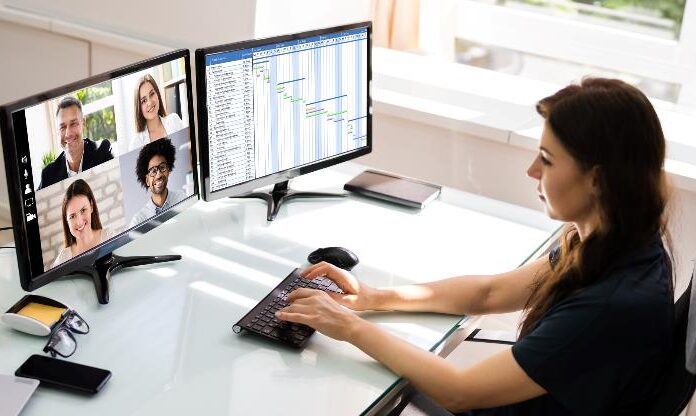As remote work becomes increasingly prevalent in the UK, creating an efficient and comfortable home office has never been more important. Whether you’re a seasoned remote worker or new to the home office scene, having the right setup can significantly boost your productivity and well-being.
Choosing the Right Space
The foundation of any effective home office is the space itself. Ideally, your home office should be a dedicated area separate from your living spaces. This separation helps create a mental boundary between work and personal life, which is crucial for maintaining a healthy work-life balance.
When selecting a space, consider factors such as natural light, noise levels, and available room. A spare bedroom, a quiet corner of the living room, or even a converted garden shed can serve as an excellent home office. If space is at a premium, consider multi-functional furniture that can be tucked away when not in use, such as a fold-down desk or a secretary cabinet.
Ensure your chosen space has adequate ventilation and temperature control. Being comfortable in your environment is key to maintaining focus and productivity throughout the workday.
Ergonomic Furniture
Investing in ergonomic furniture is crucial for your health and comfort, especially if you’re spending long hours at your desk. Start with a good quality, adjustable chair that provides proper lumbar support. Look for chairs with adjustable height, armrests, and backrests to ensure you can maintain good posture throughout the day.
Your desk is equally important. Consider a sit-stand desk that allows you to alternate between sitting and standing throughout the day. This can help reduce the negative health impacts associated with prolonged sitting. If a sit-stand desk isn’t feasible, ensure your regular desk is at the right height – your elbows should be at a 90-degree angle when typing.
Don’t forget about accessories like a footrest or a cushion for additional comfort and support. These small additions can make a big difference in your overall comfort and posture.
Lighting Matters
Proper lighting in your home office is essential for reducing eye strain and maintaining productivity. Natural light is ideal, so try to position your desk near a window if possible. However, be mindful of glare on your computer screen, which can cause discomfort and reduce visibility.
For artificial lighting, opt for a combination of ambient and task lighting. A good overhead light provides general illumination, while a desk lamp offers focused light for detailed tasks. Consider LED bulbs, which provide energy-efficient, flicker-free light that’s easy on the eyes.
If you frequently participate in video calls, invest in a good quality ring light or desk lamp with adjustable brightness and colour temperature. This will ensure you’re well-lit during virtual meetings, presenting a professional appearance to colleagues and clients.
Reliable Broadband
A reliable internet connection is absolutely essential. Slow or unstable internet can significantly hamper your productivity and professionalism, particularly during video conferences or when accessing cloud-based resources.
When choosing a broadband package, consider your specific needs. If you frequently transfer large files or participate in video calls, opt for a package with higher download and upload speeds. Fibre optic broadband is generally the best option for home offices, offering faster and more stable connections than standard ADSL.
Consider investing in a backup internet solution, such as a 4G or 5G mobile broadband dongle. This can be a lifesaver during unexpected outages or when working away from your usual setup. You should also find connectivity solutions to ensure reliable broadband. Integra Solutions are rural fibre specialists that can help with home office needs. Talk to their team to find a solution for you.
Tech Essentials
The right technology can make or break your home office setup. Start with a reliable computer or laptop that meets the requirements of your job. If you’re using a laptop, consider adding an external monitor to expand your screen real estate and improve your productivity.
For video conferencing, a decent webcam and microphone are essential. While built-in options can suffice, external devices often offer superior video and audio quality, helping you present yourself more professionally in virtual meetings.
Don’t forget about data security. Invest in a reliable external hard drive for backups and consider a virtual private network (VPN) for secure internet access, especially if you’re handling sensitive information.
Storage and Organisation
A clutter-free workspace is key to maintaining focus and productivity. Invest in storage solutions that help keep your home office tidy and organised. This might include a filing cabinet for important documents, shelving for books and supplies, or desk organisers for everyday items.
Consider vertical storage options to maximise space, especially if your home office is on the smaller side. Wall-mounted shelves or a pegboard system can be great for keeping frequently used items within easy reach without cluttering your desk.
Implement a system for managing paperwork to avoid piles of documents taking over your workspace. This might involve a combination of physical filing systems and digital document management tools.


